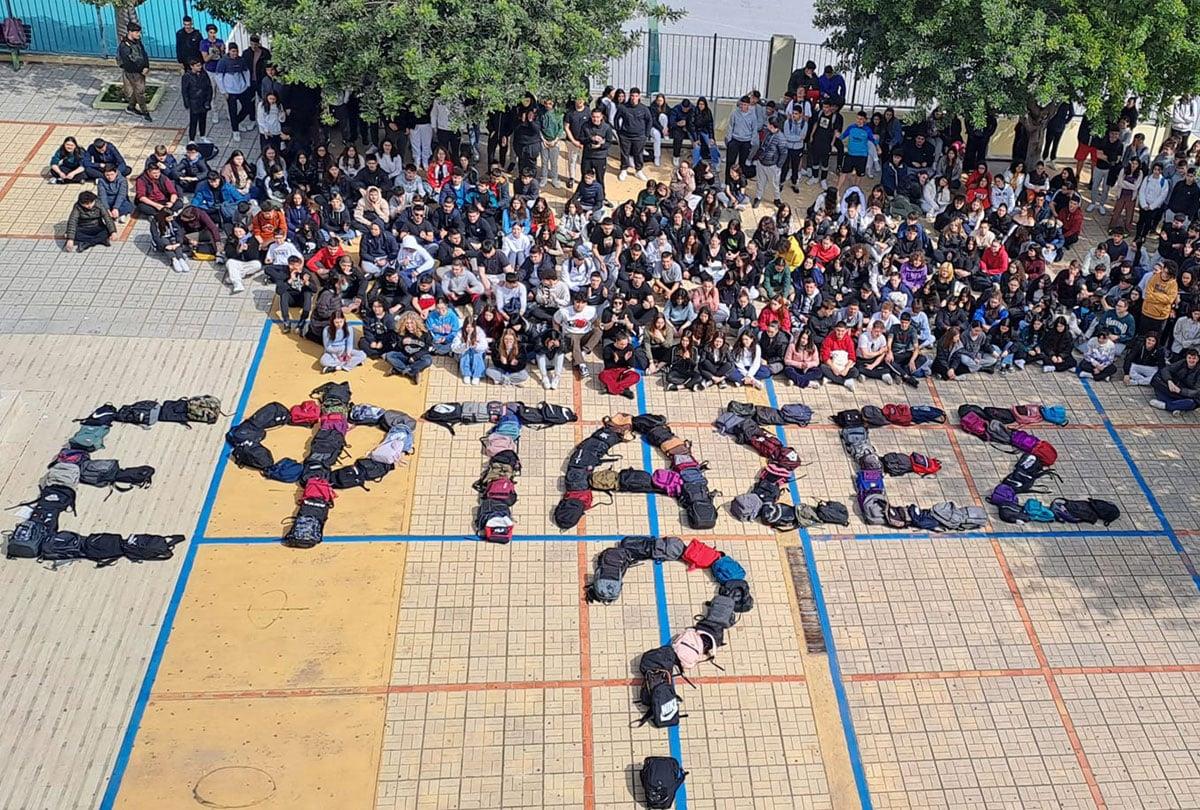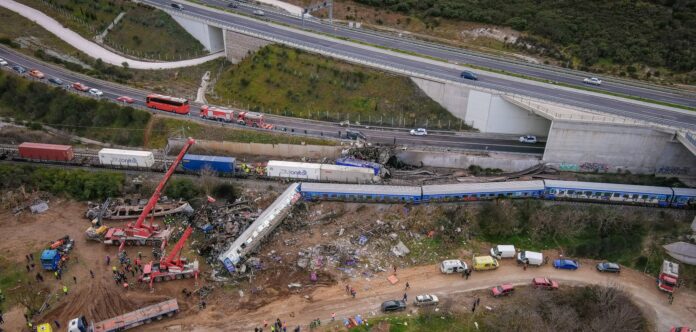By Dimitris Kouvaras,
Wednesday, February 28th. A day as any other, you may reckon. For most people in Greece, though, it was far from ordinary. I noticed that something hit differently from the moment I got out of bed and opened Instagram on my phone. Stories had started pouring in by the dozens, even by those whose social media profiles are the least political, all centred on one common cause: commemorating the sorrow anniversary of a national tragedy, whose catharsis—the cleansing effectuated when hubris has been duly punished—is yet to arrive. But it is not a tragedy performed in the marble orchestra of Epidaurus, resonating through Sophoclean or European verses; it is a tragedy performed in the iron tracks of Tempi, echoing the corrosive effects of prolonged state negligence, which, in the words of a large section of Greek society, resulted in nothing less than a crime.

Almost a year ago, for those who are unfamiliar with the story, two trains, one cargo and one intercity carrying hundreds of people, many of whom were students on the way back from a short holiday, had a full-frontal collision in the valley of Tempi, in northern Greece. The first wagons of the commercial train were instantly derailed and burst into flames, which reduced them to rubble. Most of their unfortunate occupants perished instantly, while others fought with their lives, as they tried to escape through blocked doors, some having to combat the fire with their own bear arms. Those in the back were luckier. As for the drivers, I trust that you can easily guess their fate. Overall, 57 souls were lost, making it the deadliest train disaster in the country’s history.
“How was this possible?”, you may ask. Two trains being on the same track in opposite directions seems an outrageous scenario, so blatantly problematic as to require multiple shortcomings, omissions, and mistakes to become reality. Apparently, all these factors were in place that fateful night, rendering the tragedy inevitable. However, it was by no means just a coincidence, for these omissions and shortcomings extend way back in time, spanning years of incompetent management and indifferent government. Although the EU had mandated and provided funds for installing updated electronic monitoring systems in the railways, and despite the provisions of the contract signed in 2014 (whose estimated cost doubled in the next five years due to mismanagement within the railway infrastructure company), no functional systems were in place, including simple ones such as signalling. Since the control board in the Station of Larisa was dead, operations had to be conducted manually, leaving room for error. Indeed, the stationmaster, who was solely in office contrary to safety procedures and ill-equipped for the job, fell short of avoiding it when he authorized the intercity to continue its way, ignoring the driver’s concerns. The driver’s final recorded words, to which no translation could do justice, are apocalyptic: “Here goes nothing.”.
What followed was an outburst of grief, soon giving way to an even larger outburst of public anger, embracing not only the close circle of the families who suffered the loss of loved ones but the entire spectrum of society. The fact that many victims were students, unsuspecting young people with a promising life ahead, who had just spent a few careless days of university break, bolstered social sympathy, which was combined with an acute sense of unfairness. This sentiment is still haunting many among the survivors, who wonder why they were chosen to live yet others weren’t. Still, they battle against the stains of trauma in mutual support, empowered also by the symbolic support of civil society, which confronted the disaster remarkably united for Greek standards both after it happened and on its anniversary. The Instagram stories I saw this morning were just one example of the multiple public manifestations of dissent. They are correlative to the expanding status of social media as a public forum of political discourse, self-encapsulated yet immensely dissipative. However, reaction also came in other forms: pupils showing their distress by forming the question “Did you arrive?” (because some didn’t) with their schoolbags; people marching and holding banners on the streets, reaching 20.000 in Athens this 28th of February; labour unions proclaiming a PanHellenic general strike on the same day; students writing the names of the victims in red outside Parliament, only to find them erased next morning.

Other than symbolic representations of grief and anger, what also followed the catastrophe were attempts, both institutional and lay, to interpret it and administer justice. This required establishing who exactly is responsible so that blame could be attributed, and punishment procured. It is the process of catharsis, which continues today because of conflicting approaches to accountability. One approach, undertaken by most institutional media and, of course, by the government, is to consider the disaster “the definition of human error”—in t the words of the then Development Minister Antonis Georgiadis, who recently made the outrageous statement that “nobody cares about Tempi.” According to such reasoning, which is based on a strict employment of the personal responsibility principle, the sole culprit is the stationmaster whose mistake led to the fatal authorisation. Consequently, the collision is classified as an accident, for no premeditated intent was involved, instead reducing the issue to unfortunate circumstance.
Others, however, centred around grassroots media sources and lay circles, including the section of civil society participating in the protests, think differently. They stress the decades of state negligence and corruption, the privatisation (with a clear leftist undertone) of the railways, as well as the revelation that multiple reports warning against the floundering infrastructure and the imminent risk of a serious incident had previously been sent to the Ministry of Transport. If you ask what was done with them, the answer is nothing. Ironically, Transport Minister Kostas Karamanlis was proclaiming in parliament that “no question on safety in the railways must be raised” shortly before the disaster. He couldn’t be more wrong.
Under this interpretation, which rests on the principle of state responsibility, the ultimate culprits are among those sitting in Parliament, and the collision was no less than an institutional crime, followed by a cover-up. The said minister resigned but was enabled to run in the next elections, achieving a landslide in his constituency, which proved to be so profoundly corroded by partisanism and nepotism that it lacked any degree of common sense or critical thinking -not to say basic IQ levels least I sound inappropriately dismissive and methodologically inaccurate- when it cast its vote. A year has passed, but no legal action against politicians has been taken, while the investigation has only recently entered its crucial phase under the pressure of victims’ parents dedicated to push to the limits to find justice. On a relevant note, a petition to bypass political immunity by activating the law for ministerial responsibility, which would result in a Parliament committee’s examination of the case and possibly indictment of political persons, has accumulated over 1.2 million signatures.
The one in prison is the stationmaster, whose immediate responsibility is easier to establish. However, I think not he is the sole responsible because of another principle: that full responsibility requires the corresponding capacity. That’s why children are not held equally accountable to adults when they commit indictable acts. In this case, the notion of the stationmaster’s capacity embraces the functionality of the relevant systems and infrastructure, which in turn is a direct responsibility and obligation of the state and its political authorities.
Apparently, the train of justice has yet to arrive and bring catharsis to those who yearn for it, as neither arrived the incident train to bring the passengers who are now gone to their loved ones. Nevertheless, I am tempted to say that a different sort of remedy, however limited, has been effectuated within the agony: the unity and sympathy this tragedy helped emerge within Greek society.
References
- Greeks strike to mark train crash anniversary and demand justice. Reuters. Available here
- Strikes and protests bring Greece to halt on anniversary of deadly train crash. The Guardian. Available here




